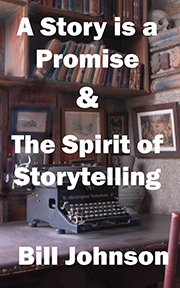| A Story is a Promise |
|
Script Services |
| Essays on the Craft of Writing |
|
|
| About the Author |
Posted 7/29/2000
The Exorcist -- Page Five Review
written by Bill Johnson
15, first sentence.
Chris slept. And dreamed about death in the staggering particular, death as if death were still never yet heard of while something was ringing, she gasping, dissolving, slipping off into void, thinking over and over, I am not going to be, I will die, I won't be, and forever and ever, oh, Papa, don't let them, oh, don't let them do it, don't let me be nothing forever and melting, unraveling, ringing, the ringing-The phone!
Chris is pulled into a state of sleep that immediately turns into a nightmare that reveals her fear of death and nothingness. It also introduces a question about her relationship to her father, who she turns to for help. There's also the question of the ringing that pulls her out of the nightmare and back to the real nightmare she's entering.
She leaped up with her heart pounding, hand to the phone and no weight in her stomach; a core with no weight and her telephone ringing.
The aftermath of the nightmare translates into a change of Chris' physical sense of being. This makes the intensity of the moment accessible to the story's audience. We feel this moment with her. This is part of the craft of making a story 'ring true.' It only works, however, when the reaction comes across as genuine. Description in a void, that doesn't affect a story's characters in a way that impacts a story's audience, is simply white noise.
Another point, in these few pages, Chris has experienced a range of feelings. Because a story for an audience is, in part, a journey of feeling, Chris's changing feelings makes the story accessible to an audience.
She answered. The assistant director. "In makeup at six, honey." "Right." "How ya feelin'?" "If I go to the bathroom and it doesn't burn, then I figure I'm ahead." He chuckled. "I"ll see you." "Right. And thanks."
The story returns to the mundane details of the film shoot, while also raising a question about Chris having a health problem.
Continuing.
She hung up. And for moments sat motionless, thinking of the dream. A dream? More like thought in the half life of waking. That terrible clarity. Gleam of the skull. Non-being. Irreversible. She could not imagine it. God, it can't be! She considered. And at least bowed her head. But it is.
Chris can shake the feeling of the nightmare. It follows her into her waking world.
She went to the bathroom, put on a robe, and padded quickly down to the kitchen, down to life in sputtering bacon. "Ah, good morning, Mrs. MacNeil." Gray, drooping Willie, squeezing oranges, blue sacs beneath her eyes. A trace or accent. Swiss, like Karl's.
Blatty quickly and naturally takes us back into the mundane of Chris's world, the robe, the 'down to life in sputtering bacon.' The introduction to Willie is quick, 17 words that also tell us something about Karl. It's quick, visual, neat work that comes in the flow of the story. It gives us a sense of Willie's character and person.
By moving forward, Blatty varies the pacing of the story. To stay too long with the reaction to the nightmare would to risk becoming repetitive to no dramatic purpose. Blatty skillfully moves us deeper into Chris' world.
To be continued.
Top of page